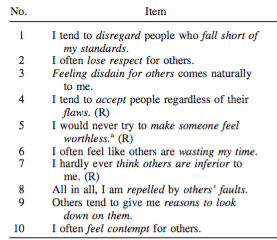Neuroscience
 Contemptuousness is a distinct personality trait that you can measure with a simple questionnaire. That's according to Roberta Schriber and her colleagues who've devised such a test and described the character of typical contemptuous person – someone quick to judge when another individual (or a social group) has failed to live up to certain expectations – either morally or in terms of competence – and who responds by looking down on this person or group, with the aim of distancing themselves from them, and/or derogating them.
Contemptuousness is a distinct personality trait that you can measure with a simple questionnaire. That's according to Roberta Schriber and her colleagues who've devised such a test and described the character of typical contemptuous person – someone quick to judge when another individual (or a social group) has failed to live up to certain expectations – either morally or in terms of competence – and who responds by looking down on this person or group, with the aim of distancing themselves from them, and/or derogating them.
In the Journal of Personality and Social Psychology the researchers describe how they tried out different items for measuring trait contempt on hundreds of students and members of the public recruited online at Amazon's Mechanical Turk survey website. They eventually settled on a 10-item test that they said best captures one's proneness to expressing and feeling contempt (see box, right). The participants were asked to score each item from 1 (strongly disagree) to 5 (strongly agree) and items 4,5 and 7 were reverse scored because in these cases stronger agreement was a mark of low contemptuousness.
Through several studies, the researchers then asked hundreds more participants to complete the new contemptuousness scale alongside other established tests of other personality constructs. From this they found that high scores on the "dispositional contempt scale" correlated with several other measures, suggesting that contemptuousness is not the same as, but tends to go hand in hand with: low trait agreeableness (no surprise there), hubristic pride (when successes are attributed to one's ability, not effort), proneness to envy, narcissism (especially the covert variety), a preoccupation with social status and hierarchy (as measured by trait Machiavellianism), an anxious attachment style, loneliness, perfectionism (in judging others, and in terms of fearing being judged by perfectionist standards by others), racism, and with low self esteem. In short, beneath their sneering veneer, contempt-prone people are needy and psychologically fragile.
To test whether the contemptuousness scale is really measuring what it's supposed to be measuring, the researchers also had hundreds more participants complete the scale before giving their reaction to video clips featuring instances of people showing low competence or moral violations, such as a beauty queen exhibiting ignorance or a soldier showing cruelty to a boy. High trait contempt scorers were especially likely to shown scornful reactions to incompetence, and to a lesser extent to moral violations, and they rarely responded with compassion, providing some support for the validity of the scale.
Finally, the researchers looked at whether trait contempt was stable over a month, and how it was related to the way that people view their relationships. They found the trait did show stability and that it was associated with perceiving one's relationship as dysfunctional, even after factoring out the part played by the broader trait of being unfriendly ("disagreeable" in personality jargon).
Intriguingly, the researchers also asked participants to rate their partner's contempt and they found that perceiving one's partner as contemptuous was associated much more strongly with the perception of being in a poor relationship, than was being contemptuous oneself. Seeing one's partner as being high in contempt "implies a partner does not appear to care about or get along with others, may be a threat to one's own self-esteem and sense of belonging, and might just be unpleasant to be around," the researchers surmised.
Schriber and her team said that it would be interesting for future research to examine what leads some people to become more contemptuous by nature than others – their results point only to correlations with other traits and don't tell us anything about causal pathways. Also, they said it would be useful to look at whether contemptuousness can be reduced through training, such as through loving-kindness meditation or compassion training. "Processes that decrease contempt may, according to our research, promote mental and behavioural flexibility; boost self-esteem; expand one's social network; lower loneliness and depression; cement romantic relationships; and overall generate more caring members of humanity," they said.
--Dispositional Contempt: A First Look at the Contemptuous Person
_________________________________
Post written by Christian Jarrett (@psych_writer) for the BPS Research Digest.
Our free weekly email will keep you up-to-date with all the psychology research we digest: Sign up!
- Free Personality Tests Are More Reliable And Efficient Than The Paid Variety
In most areas of life, we expect the free versions of products to be sub-standard compared with the "premium" paid-for versions. After all, why would anyone pay for something if the free equivalent were better? However, a new study of personality tests...
- In Search Of The Super-humane (those Who Identify With All Of Humanity)
The pages of psychology's journals are filled with sorry tales of people's intolerance and prejudice towards one another. Against this darkness, Sam McFarland and his colleagues urge us not to forget the brighter stories - the heroes of the...
- Trying To Create An Impression Can Alter Your Perception Of Others
When we’re socialising and we try to make a certain impression – to appear confident, say, or smart – doing so affects our perception of the person we’re talking to, leading us to think they have less of the same trait that we’re trying to demonstrate...
- Do You Love Humanity?
"I love humanity but I hate people"Edna St. Vincent Millay (American poet and playwright). Psychology hasn't paid enough attention to the regard people have towards humanity - their "humanity-esteem". That's according to Michelle Luke and Gregory...
- Don't Worry, Anxiety Has Its Benefits
A quick internet search for book titles hints at the scale of the market in helping people become less anxious: ‘Overcome anxiety’…; ’Calming your anxious mind’…; ’What to do when you worry too much’…; ’Power over panic’ and on...
Neuroscience
Beneath their sneering veneer, people prone to contempt are psychologically fragile

 |
| The dispositional contempt scale From Schriber et al 2016. |
Through several studies, the researchers then asked hundreds more participants to complete the new contemptuousness scale alongside other established tests of other personality constructs. From this they found that high scores on the "dispositional contempt scale" correlated with several other measures, suggesting that contemptuousness is not the same as, but tends to go hand in hand with: low trait agreeableness (no surprise there), hubristic pride (when successes are attributed to one's ability, not effort), proneness to envy, narcissism (especially the covert variety), a preoccupation with social status and hierarchy (as measured by trait Machiavellianism), an anxious attachment style, loneliness, perfectionism (in judging others, and in terms of fearing being judged by perfectionist standards by others), racism, and with low self esteem. In short, beneath their sneering veneer, contempt-prone people are needy and psychologically fragile.
To test whether the contemptuousness scale is really measuring what it's supposed to be measuring, the researchers also had hundreds more participants complete the scale before giving their reaction to video clips featuring instances of people showing low competence or moral violations, such as a beauty queen exhibiting ignorance or a soldier showing cruelty to a boy. High trait contempt scorers were especially likely to shown scornful reactions to incompetence, and to a lesser extent to moral violations, and they rarely responded with compassion, providing some support for the validity of the scale.
Finally, the researchers looked at whether trait contempt was stable over a month, and how it was related to the way that people view their relationships. They found the trait did show stability and that it was associated with perceiving one's relationship as dysfunctional, even after factoring out the part played by the broader trait of being unfriendly ("disagreeable" in personality jargon).
Intriguingly, the researchers also asked participants to rate their partner's contempt and they found that perceiving one's partner as contemptuous was associated much more strongly with the perception of being in a poor relationship, than was being contemptuous oneself. Seeing one's partner as being high in contempt "implies a partner does not appear to care about or get along with others, may be a threat to one's own self-esteem and sense of belonging, and might just be unpleasant to be around," the researchers surmised.
Schriber and her team said that it would be interesting for future research to examine what leads some people to become more contemptuous by nature than others – their results point only to correlations with other traits and don't tell us anything about causal pathways. Also, they said it would be useful to look at whether contemptuousness can be reduced through training, such as through loving-kindness meditation or compassion training. "Processes that decrease contempt may, according to our research, promote mental and behavioural flexibility; boost self-esteem; expand one's social network; lower loneliness and depression; cement romantic relationships; and overall generate more caring members of humanity," they said.
--Dispositional Contempt: A First Look at the Contemptuous Person
_________________________________
Post written by Christian Jarrett (@psych_writer) for the BPS Research Digest.
Our free weekly email will keep you up-to-date with all the psychology research we digest: Sign up!
- Free Personality Tests Are More Reliable And Efficient Than The Paid Variety
In most areas of life, we expect the free versions of products to be sub-standard compared with the "premium" paid-for versions. After all, why would anyone pay for something if the free equivalent were better? However, a new study of personality tests...
- In Search Of The Super-humane (those Who Identify With All Of Humanity)
The pages of psychology's journals are filled with sorry tales of people's intolerance and prejudice towards one another. Against this darkness, Sam McFarland and his colleagues urge us not to forget the brighter stories - the heroes of the...
- Trying To Create An Impression Can Alter Your Perception Of Others
When we’re socialising and we try to make a certain impression – to appear confident, say, or smart – doing so affects our perception of the person we’re talking to, leading us to think they have less of the same trait that we’re trying to demonstrate...
- Do You Love Humanity?
"I love humanity but I hate people"Edna St. Vincent Millay (American poet and playwright). Psychology hasn't paid enough attention to the regard people have towards humanity - their "humanity-esteem". That's according to Michelle Luke and Gregory...
- Don't Worry, Anxiety Has Its Benefits
A quick internet search for book titles hints at the scale of the market in helping people become less anxious: ‘Overcome anxiety’…; ’Calming your anxious mind’…; ’What to do when you worry too much’…; ’Power over panic’ and on...
